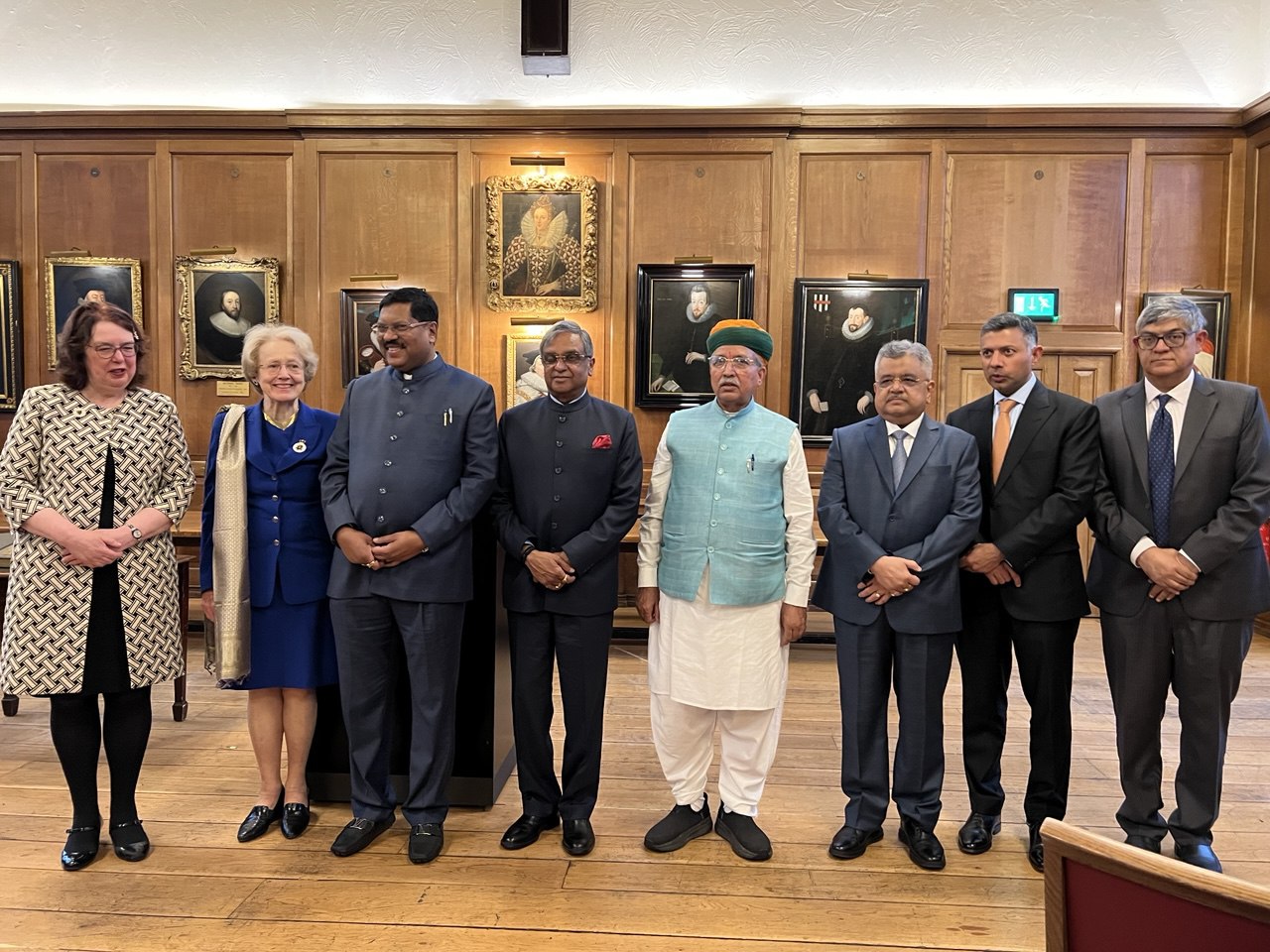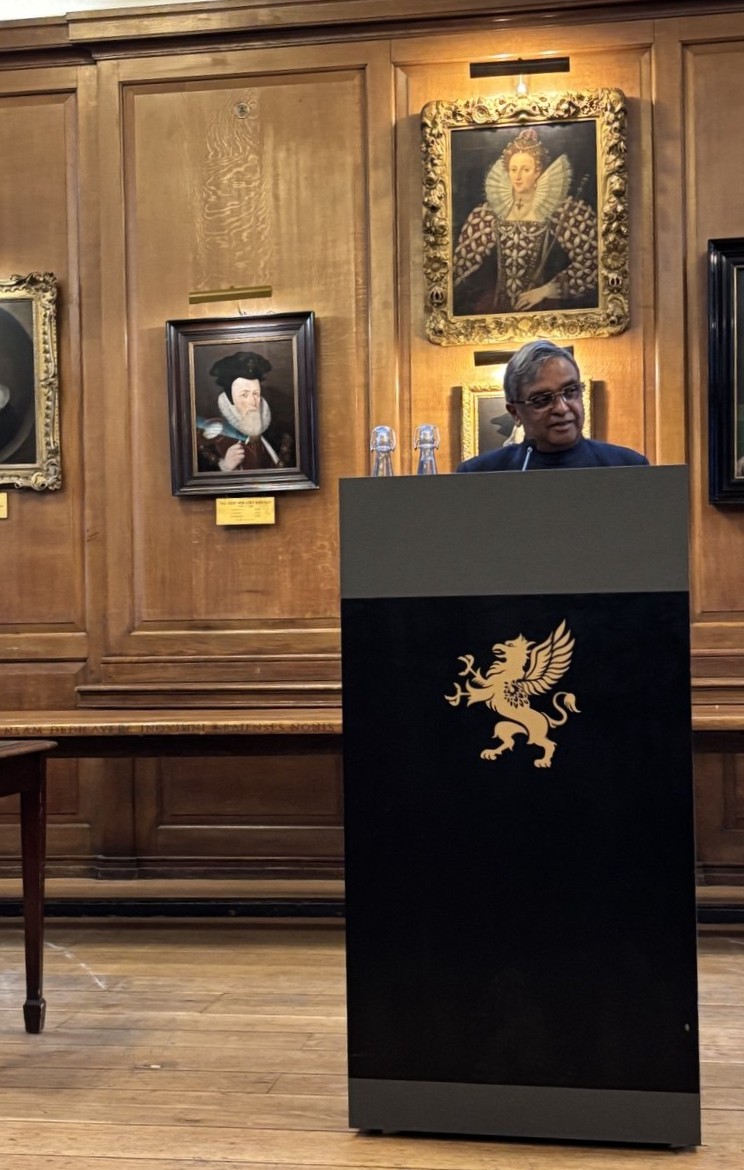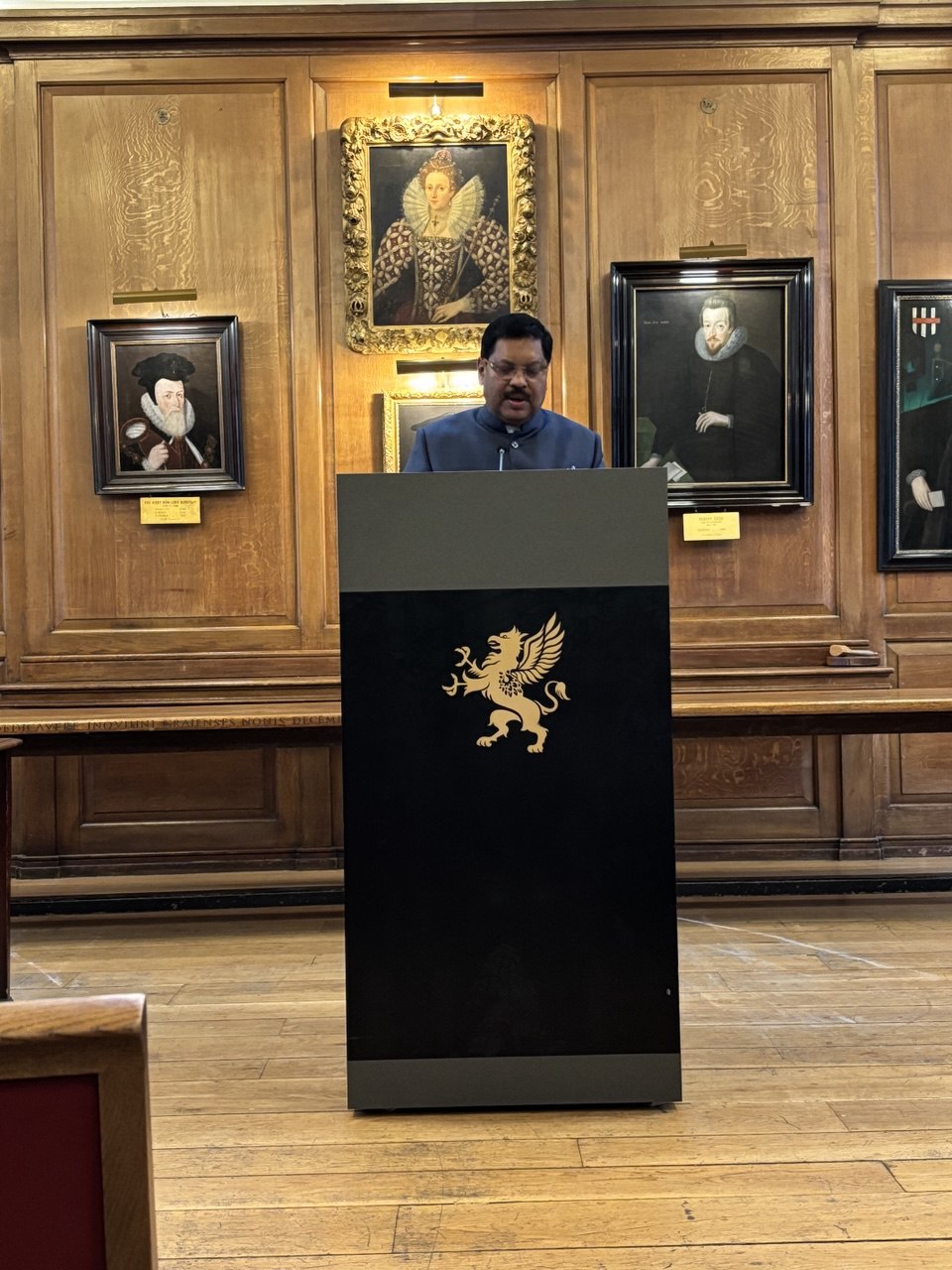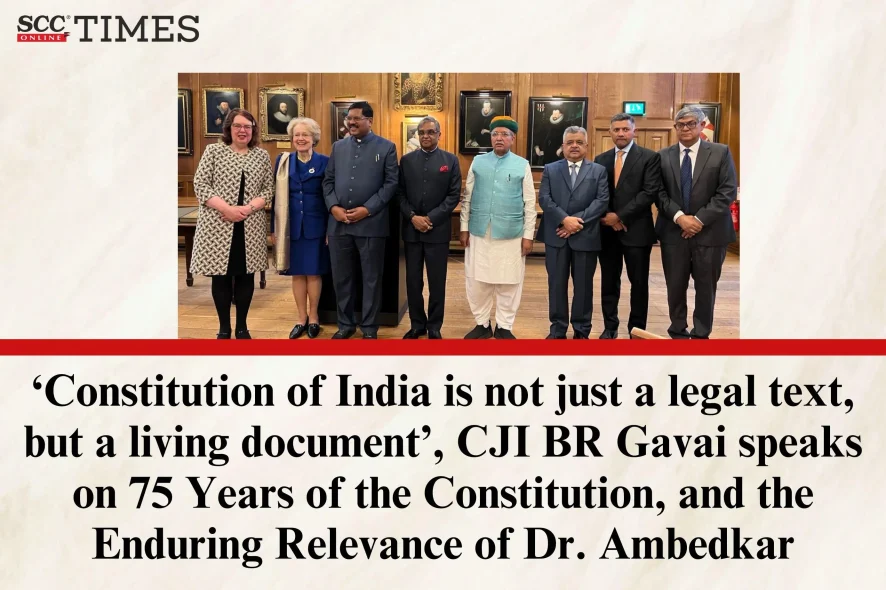Introduction
The Rt Hon Lady Justice Geraldine Andrews DBE, PC, and Vikram Doraiswami, High Commissioner of India to the United Kingdom, hosted a distinguished lecture delivered by Justice Bhushan Ramkrishna Gavai, Chief Justice of India.
Titled “The Living Document: 75 Years of the Constitution of India, and the Enduring Relevance of Dr. BR Ambedkar,” the lecture reflected on the evolution, resilience, and enduring significance of the Indian Constitution. Justice BR Gavai paid tribute to Dr. B.R. Ambedkar’s visionary role in shaping the constitutional framework and emphasised the document’s continued relevance in upholding democratic values, social justice, and rule of law in modern India.
The event brought together members of the judiciary, legal professionals, diplomats, and scholars to commemorate 75 years of constitutional democracy and engage in meaningful reflection on its ongoing journey.
The distinguished lineup of speakers also included Lady Arden, Former Justice of the Supreme Court of the United Kingdom; Justice Vikram Nath, Judge of the Supreme Court of India; Arjun Ram Meghwal, Union Minister of Law & Justice, Government of India, Tushar Mehta, Solicitor General of India; and Gourab Banerji, Senior Counsel, Essex Court Chambers.

Opening Address by Lady Arden
The event commenced with the opening address by Lady Arden. In her address, she remarked that it was a profound privilege to take part in the celebrations marking the 75th anniversary of the Constitution of India. She described the milestone as a testament to the enduring strength of democracy, noting its particular significance for the United Kingdom.
Praising the Indian Constitution as a remarkable achievement, Lady Arden highlighted its success in uniting a nation as vast and diverse as India. She emphasised that the efficacy of any constitution relies on the contributions of two key groups: firstly, the judges of the Supreme court—in this case, the Supreme Court of India, represented at the event by Chief Justice BR Gavai. She expressed her belief that international judicial dialogue enhances domestic legal understanding and commended the collaborative exchanges that have allowed the UK and India to learn from each other’s challenges and innovations.
The second essential element, she noted, lies with the founding fathers of the Constitution, with Dr. B.R. Ambedkar standing out as a foremost visionary. Lady Arden underscored that the Constitution of India is not an abstract document but a living instrument that promotes equality and unity among India’s diverse populations.
She concluded by recognising India as a land of rich intellectual and spiritual traditions—where ideas and religions such as Buddhism have flourished, and observed that the Indian Constitution, much like its heritage, reflects a balanced constitutionalism, harmonizing state powers with civil liberties, even during times of emergency. She also praised the Supreme Court of India for its role in interpreting the Constitution as a dynamic institution grounded in Ambedkar’s vision.
Justice Vikram Nath greets Justice Gavai with words of respect and recognition

Justice Vikram Nath, Judge of the Supreme Court of India, opened his remarks by stating that the gathering was not only an occasion to reflect on a great legal document but also to celebrate a great life—a life that transformed the soul of the nation.
He noted that the event commemorated 75 years of the Constitution of India, describing it as a living document that continues to evolve and breathe through the institutions it created and the people it seeks to empower. Justice Nath emphasised that the Constitution is more than just a foundational legal text; it is an active force in Indian society, touching every citizen’s daily life.
He underscored how the Constitution is modern not only in structure but also in imagination, rooted in the values of liberty, equality, and fraternity.
Justice Nath also echoed Dr. B.R. Ambedkar’s profound observation that constitutional morality is not a natural sentiment—it must be nurtured in the courts, the administration, and in everyday life. Even after 75 years, he remarked, the Constitution continues to guide and unify India, from virtual courts in remote villages to schoolchildren reciting the Preamble.
“India has flourished in the 75 years since independence, and that in every difficult circumstance, it is the Constitution that has remained the backdrop of the nation’s strength and resilience.”
He closed by affirming that, despite over a hundred amendments and numerous landmark judgments, the Constitution’s core message endures: everyone deserves liberty and opportunity. With great pride, he introduced the evening’s keynote speaker, Chief Justice Bhushan Ramkrishna Gavai, describing him as the ideal person to deliver the commemorative address.
Lecture by Justice Gavai: Celebrating India’s Constitutional Journey

Justice B.R. Gavai began his lecture by describing the moment as deeply emotional, as he stood at an institution of immense historical significance—one where Dr. B.R. Ambedkar, one of the greatest legal minds in modern history, once pursued his legal education. Speaking from that symbolic setting, Justice Gavai reflected on Dr. Ambedkar’s intellectual legacy and the profound impact he continues to have on India’s legal and constitutional landscape.
Justice Gavai noted that the Constitution of India is not just a legal text, but a living document, one that has evolved over 75 years through the institutions it created and the people it seeks to empower. He emphasised that this anniversary is also a time to celebrate the life and vision of Dr. Ambedkar, whose work fundamentally transformed the soul of the Indian nation. Justice Gavai acknowledged how personal this legacy was to him, sharing that his own father had continued Ambedkar’s mission at the grassroots level, ensuring access to public resources for marginalized communities.
Born four years after Dr. Ambedkar’s passing, Justice Gavai emphasised how Dr. Ambedkar’s courage, intellect, and relentless pursuit of equality became deeply ingrained in his own values.
He described how stories of Dr. Ambedkar’s courage and unwavering commitment to equality shaped his own values and purpose. It was through Dr. Ambedkar’s constitutional framework, he said, that individuals from humble beginnings—like himself, educated in a municipal school—could aspire to hold high positions in public life.
Justice Gavai went on to trace the evolution of the Indian Constitution, highlighting Dr. Ambedkar’s role in embedding fundamental rights and emphasising the need for remedies to protect those rights. He noted that Article 32, which provides the right to constitutional remedies, has its origins in Dr. Ambedkar’s early speeches before the Constituent Assembly. He stressed Ambedkar’s insistence that rights without remedies were meaningless.
“It is only through the visionary framework laid out by Dr BR Ambedkar, that individuals like me, who come from humble beginnings and grown up in a family that faced numerous challenges, are able to aspire to eventually attain the highest positions in the country.”
He also touched on Ambedkar’s critique of economic and social inequality, warning that political democracy would be unsustainable unless accompanied by social and economic justice. Justice Gavai recalled Dr. Ambedkar’s final speech to the Constituent Assembly, where he asserted that liberty, equality, and fraternity must function together—not as separate ideals, but as interdependent principles that sustain a democratic society.
Justice Gavai described the Constitution as a living document of justice, shaping the actions of the legislature, executive, and judiciary alike. He affirmed that Dr. Ambedkar’s vision continues to guide India, not only in its legal evolution but also in its pursuit of a more inclusive and equitable society. He noted that while the full scope of Ambedkar’s influence is vast, he would focus his remaining time on select landmark judgments that illustrate the Constitution’s continuing relevance and power.
He also reflected on the long journey India has traversed since its independence and the work still required to realize the ideals of justice and equality that Dr. B.R. Ambedkar and his contemporaries envisioned.
“We are commemorating the 75 years of Indian Constitution and started our march towards its victory. As a result of this remarkable journey, I can confidently affirm that it is the foresight and vision of Dr BR Ambedkar that has enabled the constitution to endure and stand the test of time. The making of independent India and drafting of the constitution were inseparable processes, each influencing and outweighing each other.”
Justice Gavai further highlighted the transformative journey of the Indian Constitution over the past 75 years, especially the evolving relationship between Fundamental Rights and Directive Principles of State Policy (DPSPs).
He began by recalling Kesavananda Bharati v. State of Kerala, (1973) 4 SCC 225, which marked a significant turning point in Indian constitutional jurisprudence. While the verdict was split—six judges supporting unlimited amending power of Parliament, and six opposing it—all judges unanimously acknowledged the importance of DPSPs. Justice Gavai emphasised that Fundamental Rights and Directive Principles must be seen as complementary, like two wings of a chariot, essential for ensuring constitutional balance and justice.
“As we look back at the last 75 years, we see how Dr Ambedkar achieved a crucial role in embedding fundamental rights within the constitution, emphasising their crucial nature.”
Justice Gavai also underscored the role of the judiciary in affirmative action, referencing key cases like Indra Sawhney v. Union of India, 1992 Supp (3) SCC 217 and State of Kerala v. N.M. Thomas, (1976) 2 SCC 310 and the importance of Dr. B.R. Ambedkar’s vision in shaping policies for the upliftment of marginalized communities and women.
Justice Gavai further elaborated on the expansion of constitutional rights over time, particularly the judiciary’s role in broadening the right to life under Article 21 to include rights to education, health, dignity, shelter, and a clean environment, reflecting a living and evolving Constitution. He stressed that Dr. Ambedkar viewed liberty, equality, and fraternity as inseparable principles essential for a stable democracy, warning that social and economic justice must accompany political democracy to ensure true equality.
“I can say that the journey of 75 years of the Indian Constitution has clearly been in the direction of the aim of the Constitution makers”
Concluding his lecture, Justice Gavai celebrated India’s progress over 75 years: land reforms benefiting millions of laborers and tenants, enhanced living conditions for workers, and representation of marginalized communities in the highest offices of the country, including the current President of India. He reiterated Ambedkar’s vision of the Constitution as a living document, meant to evolve with society’s changing needs.
Justice Gavai’s lecture was a powerful tribute to Dr. Ambedkar’s enduring legacy and a reminder of the ongoing journey toward realizing the full promise of India’s constitutional democracy.
Law Minister Arjun Ram Meghwal Pays Tribute to Dr. Ambedkar and the Spirit of Constitutional India
On the occasion of commemorating 75 years of India’s constitutional journey, Law Minister Shri Arjun Ram Meghwal also addressed a distinguished gathering in London.
He began by stating that it was an honour for him to speak at such a significant event, which celebrated the enduring legacy of constitutional freedom and the relevance of India’s Constitution in the modern world. He expressed sincere appreciation to the organizers for arranging the lecture in London.
He described the Constitution of India as a living document—a framework of democratic ideals for the world’s largest democracy. India, often recognized as the mother of democracy, had always upheld its reverence for the Constitution. He recalled Dr. Br Ambedkar’s famous quote:
“The Constitution is not a mere lawyer’s document. It is a vehicle of life, and its spirit is always the spirit of the age.”
Shri Meghwal stated that the Indian Constitution had laid the foundation for the nation’s unity, integrity, progress, peace, and prosperity. It provided social, economic, and political justice, and paved the way for good governance through the Directive Principles of State Policy.
He emphasised that while the Constitution guaranteed Fundamental Rights, it also reminded citizens of their Fundamental Duties. It clearly demarcated the powers and responsibilities between the Centre and the States and fostered grassroots governance through the third tier of local self-government.
He added that the Constitution had helped preserve India’s unity in diversity, maintaining institutional balance among the legislature, judiciary, and executive. This coordination, he said, had enabled India’s democracy to grow stronger, more mature, and increasingly progressive.
Referring to Dr. B.R. Ambedkar, Shri Meghwal noted that he was not only the chief architect of the Indian Constitution but also a visionary economic thinker. Dr. Ambedkar, he recalled, had pursued advanced studies abroad under difficult circumstances.
Shri Meghwal highlighted Ambedkar’s contributions as a labour reformer as well. He cited Dr. Ambedkar’s 1945 address at the Indian Labour Conference, where he advocated for bringing Indian labour standards on par with international norms.
To conclude, he stated that Dr. Ambedkar’s timeless wisdom, combined with collective action, remained key to resolving global challenges and building a more just and inclusive world. He expressed hope that the London conference would serve as an instrument for collective action, promoting peace, prosperity, and constitutional values for future generations.
The event stands as a powerful tribute to Dr. B.R. Ambedkar’s enduring legacy, reaffirming the nation’s collective commitment to justice, equality, and the democratic values enshrined in the Constitution of India.


